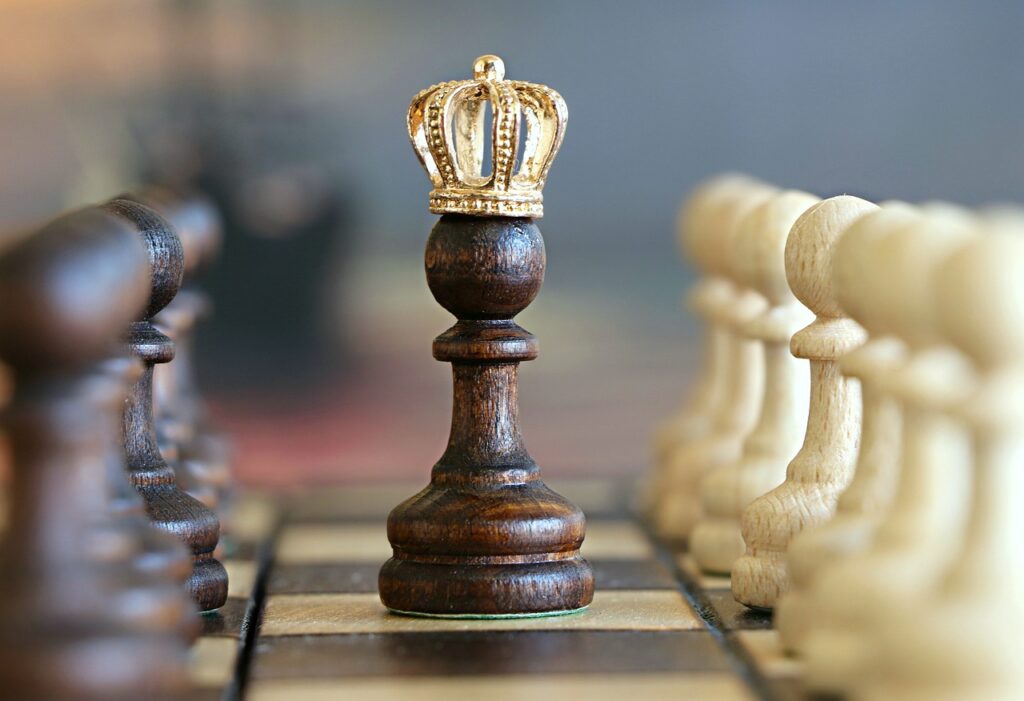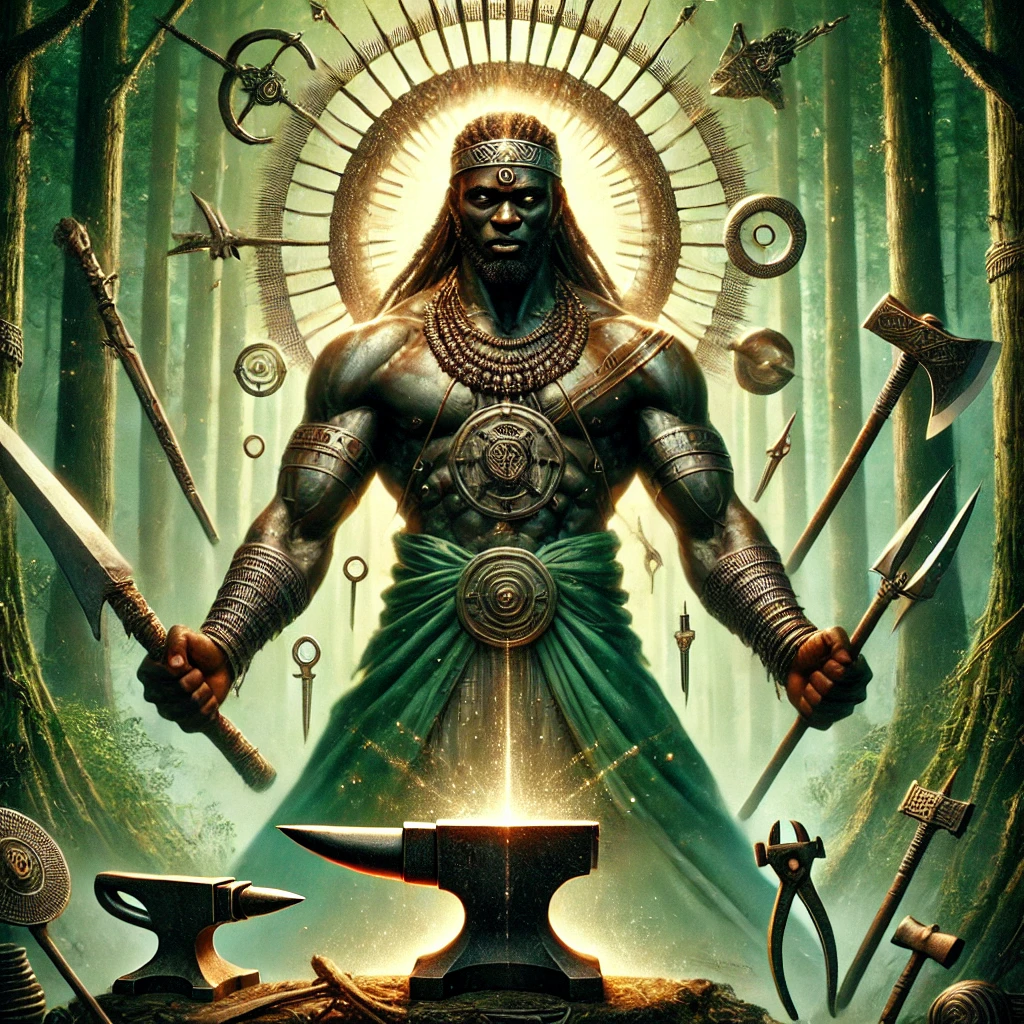Ogun, god of war and iron, holds a major place in traditional African religions, particularly among the Yoruba and the Fon. Worshiped across several regions of West Africa and throughout the diaspora, he embodies strength, warrior power, and the technology associated with metallurgy. His attributes include iron tools, weapons, and animals that symbolize strength and determination. Ogun represents war in its most brutal and destructive form. He is also a god of justice, hunting, and protection. His ancient and rich cult reflects the complexities of both war and human society.
Ogun plays a key role in African religions, especially among the Yoruba and the Fon. His name echoes through the stories of peoples who revere him for his power and his essential role in metallurgy and warfare. This god embodies not only the violence of conflict but also justice, protection, and technological progress.
Ogun, god of war in West Africa
Ogun is worshiped in West Africa, particularly in Nigeria, Benin, and Togo. He represents raw strength and the ability to dominate the environment through iron technology. The Yoruba and the Fon—renowned blacksmiths and warriors—have worshiped him since ancient times. They integrated his cult into daily life and wartime rituals.
In precolonial times, blacksmiths dedicated their work to Ogun, seeing him as the very spirit of steel. They offered animal sacrifices before using their iron tools. Without his power, no weapon could be properly forged. Ogun also ruled over warfare, as he provided the raw material for all weapons: iron.
With the transatlantic slave trade, Ogun’s cult spread to the Americas, particularly Cuba, Brazil, and Haiti. There, it took on new forms within Haitian Vodou and Brazilian Candomblé. In Haiti, Ogun—known as Ogou—became a central figure in the struggle for freedom among enslaved people. His followers prayed to him before battles or important actions, seeking his protection and blessing. Even today, his cult remains strong in the African diaspora, representing the fight for survival, justice, and transformation.
Ogun, master of iron and the forge
Ogun is the master of iron and the forge. His main attributes include all metal tools and weapons. A hammer, axe, sword, and spear are often used to represent him. The machete embodies his ability to open new paths, to clear and transform the world.
Animals are also associated with Ogun : the dog and the boar symbolize loyalty, ferocity, and raw power. The boar represents tenacity and rage—the qualities Ogun displays in battle. The dog represents faithfulness and protection. His devotees seek these traits both in war and daily life.
Ogun also wears chains and shackles, symbols of capture and domination in warfare, but also of justice, as he embodies law and the punishment of wrongdoers. His followers often sacrifice dogs, roosters, or other animals in his honor. It is common to see iron tools placed on his altars.
Iron, the material of his attributes, also represents technological progress. Through his link to the forge, Ogun embodies not only destruction but also creation. He allows humans to craft tools that change the world.
Ogun, brutal and destructive god
Ogun embodies the brutal, destructive, and unstoppable aspect of war. He is the god who charges forward with iron weapons, mercilessly breaking enemy lines. Warriors invoke Ogun before battle, hoping to receive his blessing and invincible strength. Iron—both tool and weapon—gives Ogun his dominion over war.
The peoples of West Africa, especially the Yoruba and the Fon, long viewed war as essential to survival. Conflicts over land or resources were frequent, and Ogun stood at the heart of these struggles. Every battle required reliable tools, which only blacksmiths blessed by Ogun could create. His role extended beyond craftsmanship—he symbolized the fighting spirit and endurance needed to prevail.
In the diaspora, especially in Haiti, Ogun gained new meaning during revolutions against colonial powers. During the Haitian War of Independence, enslaved people and revolutionary leaders invoked Ogun before combat, praying for his fighting spirit to guide them to victory. This connection with war became so strong that many now view Ogun as a patron of revolutions and liberation struggles.
Ogun also represents the moral dimension of war. Though associated with violence and destruction, he punishes traitors and rewards those who fight for just causes. His wars are never meaningless—they aim to restore order or protect the vulnerable. His followers believe he enforces the laws of war and ensures justice is served once the fighting ends.
God of iron
Ogun is not only a god of war; he is also a deity of justice, hunting, roads, and technology. As the god of iron, he rules over all professions involving this metal—blacksmiths, hunters, and builders alike. Every iron tool, whether for war or agriculture, depends on Ogun’s power.
Protector of travelers
His role as protector of roads and pathways is equally important. Travelers offer sacrifices to Ogun before setting out to ensure his protection. Iron, the material of tools and weapons, also symbolizes the creation of infrastructure connecting communities. In this sense, Ogun is a god of progress and civilization. He embodies the transformation of raw nature into an ordered human world.
Justice
Justice is another central facet of his identity. As a war god, he punishes those who break the rules or betray their comrades. He imposes harsh—often deadly—penalties but also rewards heroes and virtuous people. Those seeking justice or vengeance invoke Ogun, hoping the god will intervene to restore balance.
Protector of hunters
In regions where his cult is strong, particularly Nigeria and Benin, Ogun protects hunters. They rely on his blessings to succeed in their expeditions. Hunting, though seemingly peaceful, is also a form of war against nature. Ogun, master of weapons and tools, allows humans to dominate natural forces in order to survive.
Ogun also plays an important role in religious ceremonies. As an ancestral deity, he receives regular sacrifices and presides over rituals linked to war, hunting, justice, and travel. These rituals—often accompanied by dance and song—celebrate his strength and his ability to transform human life through technology and the controlled use of violence to maintain order.
Ogun, god of war, iron, and justice, embodies a brutal yet necessary force within the societies that worshiped him. From antiquity to the present day, his cult has spread across West Africa and the African diaspora. As a symbol of war and technological progress, Ogun has shaped the history of his peoples—both on the battlefield and in the forge. His many roles make him a complex deity: both destroyer and creator, guarantor of order and chaos, and above all, protector of the paths his followers walk through the ages.
See also: God of War, Gods of War



